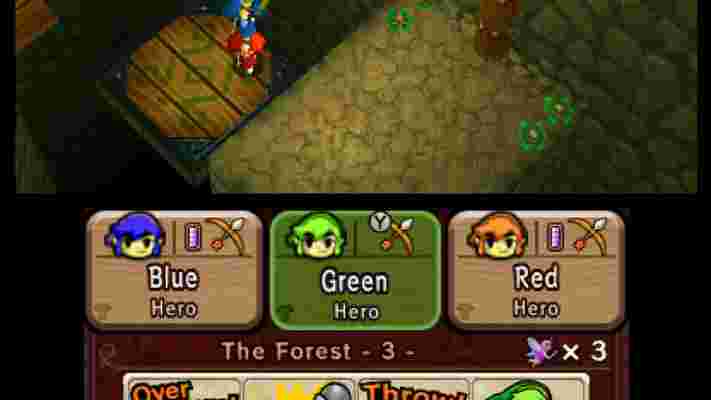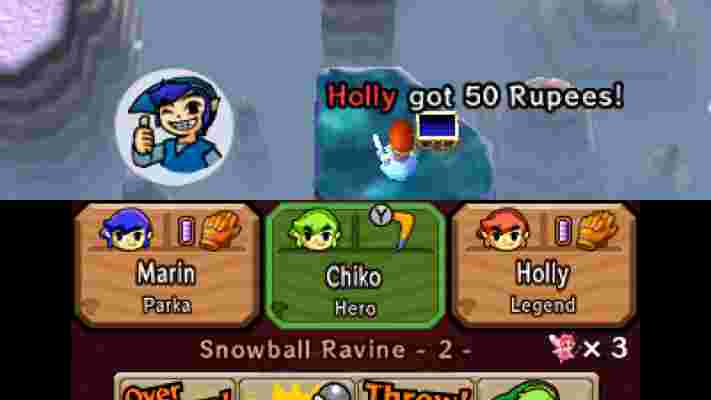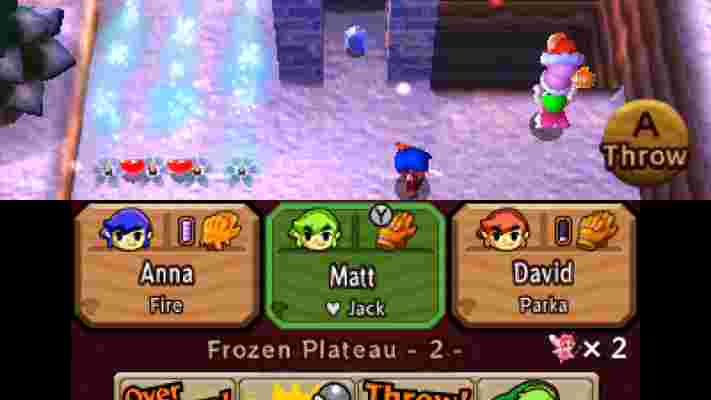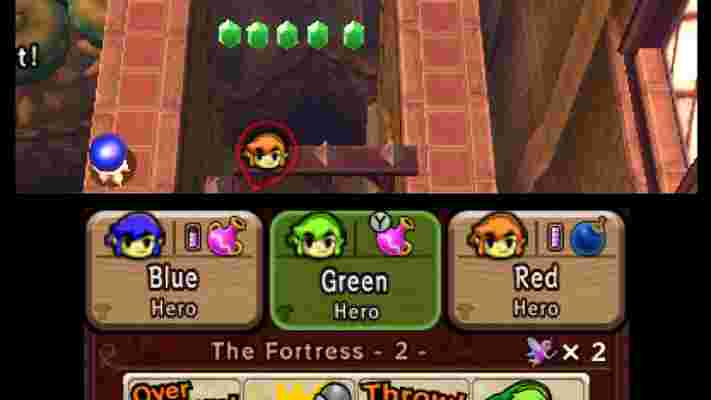Poor Purple Link. Having once had equal billing alongside his red, blue and green companions in The Legend of Zelda: Four Swords Adventures, he's now had to hang up his hat, as Tri Force Heroes, Nintendo's latest multiplayer Zelda game, is a strictly three hero affair that scoffs at the idea of even numbers. You can still play the game by yourself, of course, but venturing out to the wild and wicked Hytopia Drablands alone just isn't quite the same as playing with two buddies locally or a pair of strangers online.
This is partly because Tri Force Heroes attempts to something no other top-down Zelda game has ever done before, and that's combine full 3D puzzling with what's traditionally a flat, 2D environment. Compared to the level plains of Hyrule, for instance, Hytopia is a veritable mountain range of peaks and troughs, with switches hidden away atop towering platforms and monsters wafting aloft in the sky as they patrol their territory.

^ With its top down perspective and 3D puzzles, Tri Force Heroes really makes the most of the 3DS's stereoscopic 3D
We saw the seeds of this being sown in A Link Between Worlds , where monsters would often jump up into the 3DS's screen and layered, multi-tiered dungeons would hint at treasures that were just out of reach. But Tri Force Heroes takes it one step further, as the only way to scale these impossible heights is to, quite literally, stand on each other's shoulders to become Hytopia's fabled Totem Heroes. That might sound rather contrived (believe me, it is) but it does play to the 3DS's strengths, bringing everything that bit closer to the screen to make the most of your towering perspective over the game world.
In multiplayer mode, each player takes control of their own respective Link, but you're free to "totem-up" at any time. You obviously can't move when you're not the one at the bottom of the pile, but you can use your weapon, allowing you to take down airborne enemies and hit switches from afar. With no voice chat available, communication is handled via a palette of pictorial icons on the lower touchscreen. It works surprisingly well, and can alert your companions to the task at hand, congratulate them for a job well done (the animated cheerleader pompoms are a particularly brilliant touch) or even apologise when you mess up, adding an extra layer of charm to each online outing.

^ Press an emotion icon multiple times on the touchscreen and its size will increase to grab the attention of other players
Solo players, on the other hand, must switch between each Link manually via a quick tap on the lower touchscreen. This has its benefits, as it means you have complete control over everything that's happening onscreen. Any damage to your collective life bar is entirely your fault, and you don't have to wait around for other players to try and work out what they're meant to be doing. However, you do often waste a huge amount of time simply moving each Link from A to B, as they don't all follow behind you when you're not controlling them like in Four Swords Adventures. Forming a totem does help in this respect, but when some stages start you all in different parts of the level, that's not always possible.
Sadly, two player co-op simply isn't supported in Tri Force Heroes, so you'll need to find a third wheel before you can start playing. Thankfully, help is at hand for local adventurers, as those without a copy of the game can always join in via the 3DS's Download Play feature. Otherwise, you might be in for a long wait in the game's online lobbies if you decide to venture out with a bunch of strangers, but this is bound to get a lot quicker once the game is released. Nintendo's also said that it will pair you and a friend with a stranger if you can't find a third person, but this only works if you're playing online.

^ Each player has their own magic bar for using their weapons, but you all share the same health bar
However, those expecting a traditional Zelda game may be disappointed, as Tri Force Heroes follows in the same vein as Four Swords Adventures, focusing on distinct, pre-defined stages rather than letting players roam freely across an open map. However, Tri Force Heroes takes this segmentation one step further by splitting each level into four separate chambers, rigidly alternating between light puzzling solving and intense monster battles which culminate in an end-of-level boss fight at the end of the fourth and final stage.
Of course, it could be argued that every Zelda game follows this same basic template, but here it feels oddly bland and prescriptive, particularly when its cast members aren't being put to particularly good use. There are moments of genius to be found when all three players must work together in tandem to reach their goal, using each other's skills to propel them over gaps and throw items back and forth between different Links, but often the results are more fragmented, with players working independently rather than simultaneously.

^ This particular level in the Fortress is one of Tri Force Heroes' highlights as it makes excellent use of the three available weapons
Monster rooms are particularly guilty of this, at least from a single player perspective. Online, everyone can get stuck in, but those playing the game alone can usually deal with threats single-handedly. All they need to do is pick the Link with the most appropriate weapon and dive into the fray, leaving the other two to languish in the background unless you need a leg up to a higher platform.
The puzzle rooms don't always make great use of your added height either, as time and again it usually all boils down to the same solution: throwing your Links up on to ever higher platforms and then waiting until whoever's at the top to work their magic. As a result, Tri Force Heroes feels oddly lacking in imagination at times, and its fixed structure quickly becomes a bit predictable and routine.
^ In multiplayer, each player can choose their own costume to fit the weapons available in each level. Single players, however, can only pick one costume, with the other two defaulting to the standard Hero costume
You can spice things up a bit with Tri Force Heroes' additional costume power-ups, as these can either enhance the power of your weapons or add generous safety nets for more casual players. One even gives you a literal cushioned suit to help protect against weaker monsters. This is handy when you're playing online, as you all share the same life bar, but it's a shame that single players can't assign different costumes to each of their three Links. Instead, you only get to choose one, which feels like a bit of a wasted opportunity when so many of them could change the way you play.
You'll need to put in the work to unlock the costumes, though, as each one requires multiple materials to make, many of which can only be obtained via repeat playthroughs or undertaking one of the game's many challenge stages. These unlock after you've completed each individual zone, adding everything from time attacks (virtually impossible in single player) to evading Wall Master enemies and popping balloon tasks to the levels you've just played. However, material rewards are randomised at the end of each level, so you're not even guaranteed to get the item you're after at the end of it. This can get pretty tiresome if you're after one item in particular, and it can feel like a rather artificial way of extending Tri Force Heroes' longevity. Likewise, many of the more environment-specific costumes, such as the lava-defying Goron suit, can only be obtained after you've completed the courses they're best suited too, which rather defeats the point of unlocking them in the first place.
^ There are plenty of costumes to unlock in Tri Force Heroes, but you'll need to play levels multiple times before you can gather all the necessary materials
There are a lot of smart ideas in Tri Force Heroes, and it's all soundtracked by an exceptional score, but they don't always hold together quite as seamlessly as you might expect. The costumes are fun but you rarely get to use them in the main story, and it never quite rectifies that fundamental tension of catering for both single and online play. The decision to ditch the competitive element of Four Swords Adventures also takes away that thrill of playing co-operatively, making the game seem more like Tri-Hard Heroes than anything else. In this sense, it's perhaps just as well Purple Link didn't make the final cut this time round, as as his stuffed shirt companions just don't know when to let their hair down. There's still plenty to like here, but those after a more traditional Zelda adventure will be better off picking up A Link Between Worlds instead.
| Availability | |
|---|---|
| Available formats | Nintendo 3DS |
| Buying Information | |
| Price including VAT | £30 |
| Supplier | www.argos.co.uk |
| Details | www.nintendo.co.uk |
| Product code | N/A |
